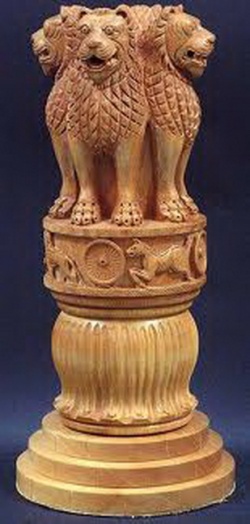Difference between revisions of "Ashoka"
| (One intermediate revision by the same user not shown) | |||
| Line 1: | Line 1: | ||
[[File:4544ges.jpg|thumb|250px|]] | [[File:4544ges.jpg|thumb|250px|]] | ||
| + | |||
| + | |||
| + | |||
| + | |||
| + | |||
| + | |||
| + | |||
| + | |||
<poem> | <poem> | ||
[[Ashoka]] | [[Ashoka]] | ||
| − | [[阿育王]] (r. c. 268–232 B.C.E.) (Skt; Jpn [[Aiku-o]]) | + | [[阿育王]] (r. c. 268–232 B.C.E.) (Skt; Jpn [[Aiku-o]]) [[Ashoka]] ([[A-shu-ga]]): [[Buddhist King]] who ruled [[India]] from 272-231 BCE. He sent his son [[Mahinda]], a [[monk]], and his daughter [[Sanghamitta]], a [[nun]], to [[Sri Lanka]] as [[Missionaries]]. He also sent other [[missionaries]] to various parts of [[Asia]] and even to [[Africa]] and [[Europe]]. |
| + | |||
| + | The third [[ruler]] of the [[Indian]] {{Wiki|Maurya}} {{Wiki|dynasty}} and the first [[king]] to unify [[India]]. He was the grandson of [[Chandragupta]], the founder of the {{Wiki|Maurya}} {{Wiki|dynasty}}, and the son of the second [[king]], {{Wiki|Bindusara}}. [[Ashoka]] began as a tyrant but later converted to [[Buddhism]] and governed {{Wiki|compassionately}} in accordance with [[Buddhist]] ideals. He is said to have put to [[death]] his ninety-nine half brothers upon ascending the [[throne]]. In 259 B.C.E., nine years after becoming [[king]], he conquered the {{Wiki|kingdom}} of [[Kalinga]], where he is reputed to have killed about 100,000 [[people]] and imprisoned 150,000. Though [[Ashoka]] had converted to [[Buddhism]] two years earlier, [[seeing]] the tragedy his forces had brought upon the conquered populace of [[Kalinga]] [[awakened]] him to his [[own]] [[cruelty]] and led him to become a devout [[Buddhist]]. | ||
| + | |||
| + | He renounced conquest by force, adopted "conquest by [[Dharma]]" ({{Wiki|principles}} of right [[life]]), and thereby established a [[peaceful]] reign. Proclaiming a policy of public works, he founded hospitals for [[people]] and [[animals]] and, along major trade routes, planted [[trees]], dug wells, and built resthouses and other facilities. Every five years he dispatched officials to outlying areas to ascertain the people's [[condition]]. He sent [[Buddhist]] [[missionaries]] to southern [[India]], [[Kashmir]], [[Gandhara]]d [[Sri Lanka]], and even as far away as {{Wiki|Syria}}, {{Wiki|Egypt}}, and [[Macedonia]]. To [[Sri Lanka]] he sent his son [[Mahendra]] and his daughter [[Samghamitra]], who spread [[Buddhism]] there, while to [[Kashmir]] and [[Gandhara]] he sent a [[Buddhist monk]] named [[Madhyantika]]. | ||
| − | + | Though devoted to the spread of [[Buddhism]], he did not enforce [[Buddhism]] as a [[state]] [[religion]], but protected the [[religious]] freedom of the [[Jains]], [[Brahmans]], [[Ajivikas]], and others. The [[Third Buddhist Council]] for compiling the [[Buddha's teachings]] was held at the {{Wiki|Mauryan}} {{Wiki|capital}}, [[Pataliputra]], under [[Ashoka's]] {{Wiki|patronage}}. His achievements and [[views]] are recorded not only in [[Buddhist scriptures]] but also in the many {{Wiki|edicts}} inscribed on rock surfaces and pillars that have been discovered. | |
</poem> | </poem> | ||
| + | |||
| + | |||
{{R}} | {{R}} | ||
| − | [http://www.sgilibrary.org/search_dict.php?id=98 www.sgilibrary.org] | + | [[http://www.sgilibrary.org/search_dict.php?id=98 www.sgilibrary.org]] |
| + | [[Category:Buddhist Terms]] | ||
| + | [[Category:India]] | ||
[[Category:Ashoka]] | [[Category:Ashoka]] | ||
Latest revision as of 11:14, 14 May 2023
Ashoka
阿育王 (r. c. 268–232 B.C.E.) (Skt; Jpn Aiku-o) Ashoka (A-shu-ga): Buddhist King who ruled India from 272-231 BCE. He sent his son Mahinda, a monk, and his daughter Sanghamitta, a nun, to Sri Lanka as Missionaries. He also sent other missionaries to various parts of Asia and even to Africa and Europe.
The third ruler of the Indian Maurya dynasty and the first king to unify India. He was the grandson of Chandragupta, the founder of the Maurya dynasty, and the son of the second king, Bindusara. Ashoka began as a tyrant but later converted to Buddhism and governed compassionately in accordance with Buddhist ideals. He is said to have put to death his ninety-nine half brothers upon ascending the throne. In 259 B.C.E., nine years after becoming king, he conquered the kingdom of Kalinga, where he is reputed to have killed about 100,000 people and imprisoned 150,000. Though Ashoka had converted to Buddhism two years earlier, seeing the tragedy his forces had brought upon the conquered populace of Kalinga awakened him to his own cruelty and led him to become a devout Buddhist.
He renounced conquest by force, adopted "conquest by Dharma" (principles of right life), and thereby established a peaceful reign. Proclaiming a policy of public works, he founded hospitals for people and animals and, along major trade routes, planted trees, dug wells, and built resthouses and other facilities. Every five years he dispatched officials to outlying areas to ascertain the people's condition. He sent Buddhist missionaries to southern India, Kashmir, Gandharad Sri Lanka, and even as far away as Syria, Egypt, and Macedonia. To Sri Lanka he sent his son Mahendra and his daughter Samghamitra, who spread Buddhism there, while to Kashmir and Gandhara he sent a Buddhist monk named Madhyantika.
Though devoted to the spread of Buddhism, he did not enforce Buddhism as a state religion, but protected the religious freedom of the Jains, Brahmans, Ajivikas, and others. The Third Buddhist Council for compiling the Buddha's teachings was held at the Mauryan capital, Pataliputra, under Ashoka's patronage. His achievements and views are recorded not only in Buddhist scriptures but also in the many edicts inscribed on rock surfaces and pillars that have been discovered.
